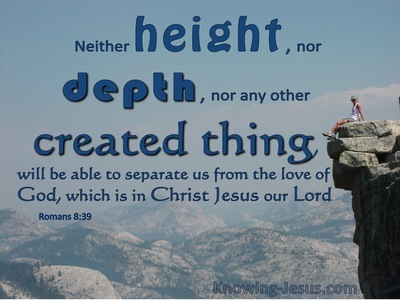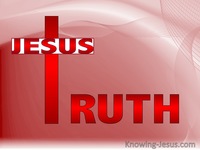◄ What Does Jude 1:6 Mean? ►
And angels who did not keep their own domain, but abandoned their proper abode, He has kept in eternal bonds under darkness for the judgment of the great day,
Jude 1:6(NASB)
Verse of the Day
Using three consecutive verses, Jude illustrates three different examples of apostasy in times past, where an extended period of God's grace is eventually followed by utter destruction. God is long-suffering to all people and not willing that any should perish, but that all should come to repentance.
Verse 5 speaks of Israel's wilderness wanderings where all but two of the people redeemed from Egyptian slavery, were 'destroyed' in the desert because of unbelief. For 40 years God was gracious to them, providing manna from heaven, water from the rock, and the presence of God within the camp, but they never entered His promised rest, due to apostasy. They knew the truth but rejected it. These people were saved spiritually, but their choices caused them to live a defeated life rather than a victorious one and destroyed their soul-life.
Verse 7 uses the destruction of Sodom and Gomorrah to illustrate apostasy in those depraved cities. Despite the influence of Abraham's nephew, Lot, who was a citizen of Sodom and who warned them to escape from the wrath to come, these pagans were all destroyed when fire and brimstone rained down on these apostate people. These citizens heard the truth from both Lot and the two visiting angels, but they would not believe and be saved. These unbelievers rejected God's offer of salvation, which caused their souls as well as their bodies to be destroyed.
In verse 6 we read: "The angels who did not keep their own domain, but abandoned their proper abode, have been kept, by God, in eternal bonds under darkness, waiting for the judgment of the great day." Jude not only used redeemed Jews and pagan Gentiles to illustrate the terrible consequences of knowing the truth yet rejecting it, but he also used beings in the angelic realm.
Jude illustrated apostasy in believers (Israel), unbelievers (Sodom), and angels, to demonstrate the serious destruction that is appointed for all apostates. Although a truly saved believer is justified (like those redeemed from Egypt), falling from grace into doubt and unbelief will eventually result in deliberate rebellion against God and a wasted life, which will end in the utter destruction of one's soul-life.
For an unbeliever who is spiritually dead in their sin and has wilfully rejected God's offer of salvation through faith in Christ, the result will be the destruction of both body and soul, while angels who rebelled with Satan are given no offer of salvation and are also utterly destroyed. As Hebrews 2 reminds us: "It was not angels but the descendants of Abraham that Jesus came to help."
There are a number of places where fallen angels are incarcerated. The Abyss, which is also called the bottomless pit, is where certain apostate demonic beings and evil angels are currently incarcerated. Hell was originally created as a place to imprison the angels who rebelled. But it is also the place where unbelievers, who reject God's offer of salvation, remain until they are judged at the Great White Throne of God. Tartarus is a sub-section of hell. It is the prison in which the fallen angels of Genesis 6 are kept in chains of darkness, while Paradise, which is sometimes called 'Abraham's Bosom' is where believers were kept until Christ "took the spirits and souls of the righteous," into heaven, following His glorious Resurrection from the dead.
The angels in this verse "who did not keep their own domain, but abandoned their proper abode," are those who rebelled with Satan and also sinned in Genesis 6: "When the sons of God came in unto the daughters of men, and they bare children to them." Although all angels who chose to rebel with Satan lost their position in the holy, heavenly angelic realm, this group also abandoned their angelic form by taking on a human form in order to have sex with human women, which resulted in a hybrid offspring, described in Genesis as giants or Nephilim. However, the message to us from Jude is a warning to all who have a common faith with the apostle, against falling into apostasy.
Both believers and unbelievers need to understand the destructive nature of apostasy. When unbelievers become rebellious and allow their hearts to become hardened, they reject salvation which will destroy both their body and soul. When believers become rebellious and live according to their own lusts, they will remain saved but their soul-life will be destroyed. They will lose the opportunity to live a life that honours the Lord: "Saved, yet as though by fire," as Paul puts it.
Jude's illustrations of apostacy is a serious warning to all who share his faith in Christ. May we consider carefully this warning and seek to live victorious lives by walking in spirit and truth, trusting His Word alone, living in complete dependence of the Lord, and being ready and willing to say, 'THY will not mine be done in my life'.
My Prayer
Heavenly Father, thank You for the warning against falling into apostasy and of the serious consequences that befall all apostates. Thank You that You give every man and woman an opportunity to know You, for the heavens declare Your glory, the earth sings forth Your praise, our inner conscience reminds us to eschew evil and choose the good, and Your Word guides us into all truth. Thank You that You are long suffering and not wiling that any should perish, but that all come to repentance and a saving faith in Christ. Keep my heart open to You and prevent me from falling into any form of apostasy. Lord, my desire is to honour Your name and by Your grace may I run the race that is set before me, looking to Jesus, day by day, AMEN.
Choose a Verse from Jude 1
Jude 1:6 Further Study
- Jude 1:6 in the Parallel Bible
- Jude 1:6 in the Thematic Bible
- Jude 1:6 Cross References
- Jude 1:6 Treasury of Scripture Knowing
- Jude 1:6 Sermons
- Jude 1:6 Prayers
- Jude 1:6 Images
- Choose Chapter
-
Jude
-
Never miss a post













